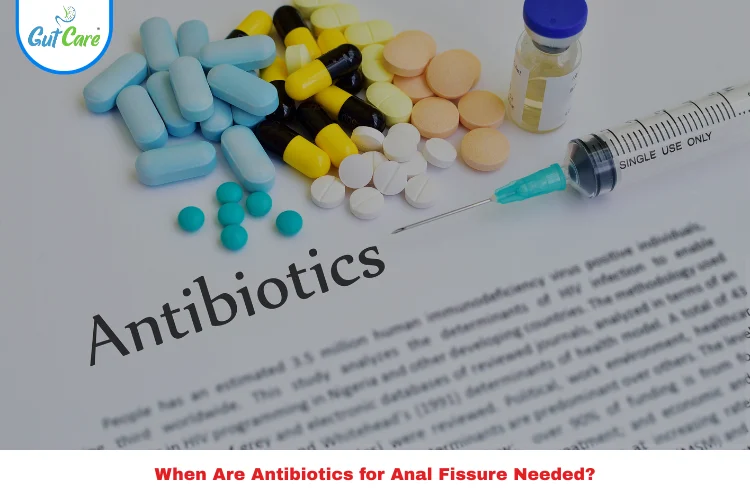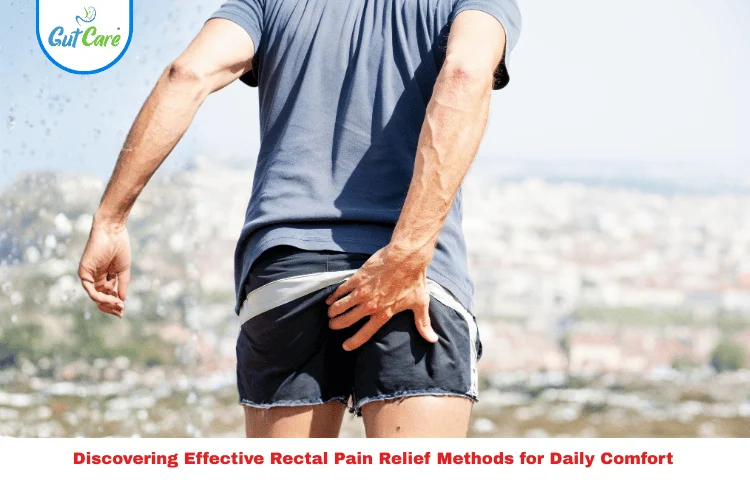Antibiotics for anal fissure are not the first course of action. At GutCare Clinics, we give importance to natural healing with traditional methods such as sitz baths for fissure, dietary fiber, and ointments. However, when symptoms of infections like swelling, pus, or fever rise — antibiotics become important to avoid difficulties like chronic fissure or abscess.
Are Antibiotics For Anal Fissures Always Necessary for Anal Fissures?
No, anal fissures are tiny tears in the lining area of the anus that are typically brought on by hard stools, straining, or constipation. Most of the time, non-invasive procedures—without the use of antibiotics—can heal them.
However, there is a huge chance of major complications if an anal fissure gets infected, such as:
- Abscess formation
- Chronic non-healing fissure
- Spread of infection to nearby tissue
Signs an anal fissure may be infected include:
- Redness and swelling around the anus
- Yellow or green discharge
- Fever or chills
- Worsening pain not responding to ointments
- No improvement despite 1–2 weeks of conservative care
In these cases, Dr. Yuvrajsingh Gehlot, a GutCare specialist, might suggest topical or oral antibiotics to prevent infection and promote healing.
When GutCare Suggests Antibiotics for Anal Fissures
Only in the following circumstances antibiotics for anal fissures are prescribed:
- Clear symptoms of infection in the perianal region or fissure.
- post-operative infections after anal abscess drainage or fissure surgery
- Frequent or ongoing cracks that could be brought on by bacteria
- Co-existing conditions like fistula, abscess, or infected hemorrhoids
At GutCare, we use evidence-based assessment. You may be advised to try:
- Sitz baths 2–3 times a day
- Stool softeners and fiber supplementation
- Topical treatments like nifedipine cream for fissure, nitroglycerin ointment, or anal fissure ointment
Only if healing fails or infection sets in will we introduce antibiotics.
Risks of Using Antibiotics Without Medical Guidance
Although they can provide relief, antibiotics can cause new issues if they are used before an infection has been confirmed:
- Antibiotic resistance — making future infections harder to treat
- Disruption of gut flora — causing digestive upset or yeast overgrowth
- Allergic reactions — ranging from rashes to extreme anaphylaxis
That’s why GutCare features accurate diagnosis and targeted therapy. We also encourage non-antibiotic ways whenever possible.
How to Know If Your Anal Fissure Is Healing — or Not
Signs a fissure is healing:
- Reduced pain, particularly during bowel movements
- No new bleeding
- Easier bowel movement and softer stools
- Reduced dependence on topical creams or fissure ointment
If you don’t see improvement within 1–2 weeks, or you notice new discharge, fever, or increased pain, these may be signs your fissure is infected — and you should see a fissure doctor near you immediately.
GutCare’s Step-by-Step Anal Fissure Treatment
Here’s how GutCare approaches fissures — with or without antibiotics for anal fissures:
Initial diagnosis — physical exam and history-taking
Lifestyle and dietary correction — increase fiber, hydration
Topical medications — including anal fissure ointment, nifedipine cream, and pain-relief gels
Sitz baths for fissure — 15 minutes, 2–3 times daily
Add stool softeners — to avoid re-injury
Antibiotics — only if infection is confirmed
Surgical referral — if conservative methods fail; includes fissure operation or laser treatment for anal fissure
Final Thoughts
Antibiotics play a role in anal fissure treatment, but only in cases of confirmed infection. At GutCare, we believe in empowering patients with effective home-based remedies and reserving antibiotics — and surgery — for when they’re truly needed.
If you’re experiencing persistent pain, bleeding, or signs of infection, don’t guess. Consult a fissure doctor or visit GutCare clinics to get a personalized plan that ensures safe and complete healing.
FAQs: Antibiotics for Anal Fissures
1. Which antibiotic is the best for amal fissures?
Metronidazole is frequently used if infection is present. Sometimes it’s combined with ciprofloxacin. Always consult your doctor.
2. Is ciprofloxacin good for fissures?
It can help with infection but doesn’t heal the fissure itself. It’s not used for routine fissure operation.
3. Is fissure a bacterial infection?
No, most fissures are from trauma (such as hard stools). Infection is not the cause,it is a consequence.
4. Can antibiotics heal fissures?
No. Antibiotics are only effective when an infection is present. Typically, topical creams, dietary adjustments, and sitz baths are needed for healing.
5. When should I consult a doctor?
If your fissure lasts over 2 weeks, bleeds, or shows signs of infection, consult a fissure specialist.




